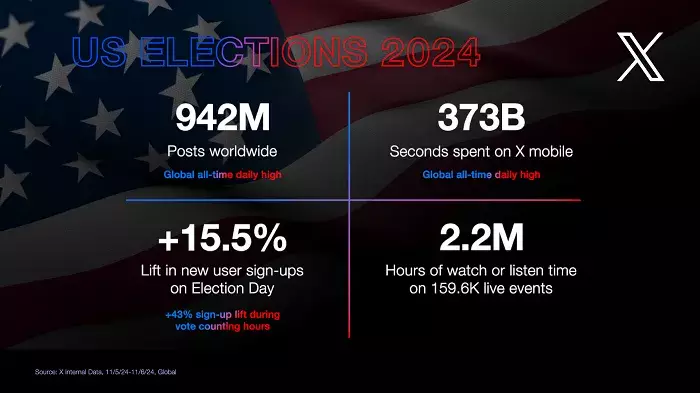The recent U.S. presidential election concluded with a significant turn of events: former President Donald Trump secured a second term in an intensely polarized political environment. This outcome is not just pivotal for the nation but also for various stakeholders, particularly Elon Musk and his social media platform, X, formerly known as Twitter. The implications of this election resonate far beyond the political realm, extending into the business dynamics of social media, user engagement, and the potential for a reinvigorated ad strategy.
The Surge in User Engagement on X
Amid the fierce electoral battle, one surprising takeaway was the pronounced increase in engagement on X. The platform reported a record number of posts on election day, augmenting its claims of “record-high” usage. This performance effectively underscores the significance of real-time communication in times of heightened political activity. In September of the previous year, X boasted approximately 500 million daily posts, with user engagement figures also reaching staggering heights—339 billion active mobile user seconds recorded in January. Election day revealed an uptick in both new user registrations and post frequency, suggesting that many individuals sought a platform that catered to their thirst for immediacy and updates.
The shift in user behavior seems intricately connected to the limitations of other emerging platforms like Threads. Users found Threads’ lack of real-time updates and its aversion to political discussions unsatisfactory, driving them back to X to keep pace with the fast-evolving electoral narrative. This migration reinforced X’s position as a hub of lively political discourse, indicating that during pivotal moments, users are inclined to gravitate toward platforms that provide the information they crave.
Trump’s win not only presents new advertising possibilities for X but also implies a strategic realignment of the platform’s identity. Historically, under Musk’s leadership, X aligned itself with right-wing ideologies, raising concerns about divisiveness and its reflection of the broader American populace. However, with the electoral success of Trump—whose base has a significant presence on the app—there arises an opportunity for X to reposition itself favorably among both users and potential advertisers.
The political dynamics are shifting; as perceptions of X evolve with Trump’s victory, advertisers who previously shied away might reconsider their stance. The platform’s alignment with right-leaning sentiments could attract brands looking to resonate with conservative audiences. Consequently, X may be able to leverage this newfound political capital to attract investment and partnerships that were previously elusive.
Musk’s backing of Trump may reshape X’s role on the global stage. The CEO’s ability to showcase X as a valuable advertising space for right-leaning voices amplifies its potential beyond U.S. borders. Should Musk successfully navigate this political landscape, he could offer insights and support to other political factions worldwide, enhancing the platform’s influence and appeal. Political strategists could find value in Musk’s affiliation with Trump, presenting X as a venue through which political narratives can be effectively communicated and amplified.
Amid these considerations, Musk himself may find new opportunities interwoven with his political ambitions. Trump’s administration could position Musk in roles that compliment both his business ventures and political aspirations, potentially rewarding him for his support and influence in the digital dialogue.
Despite the optimism that Trump’s victory injects into Musk’s endeavor with X, the platform faces foundational challenges. Revenue streams were significantly impacted under prior management, necessitating concerted efforts to rectify its financial trajectory. As engagement metrics showcase potential for user growth, the reality remains that X must innovate and adapt its business model to regain the trust of advertisers and navigate the competitive landscape of social media effectively.
As discussions about government spending and fiscal responsibility emerge, Musk’s involvement in these areas could further shape the narrative around X. Should he successfully argue the platform’s significance as a political tool, new partnerships may flourish, providing much-needed financial support to restore the app’s standing.
The electoral triumph of Donald Trump opens new avenues for Musk’s ambitions with X. While the platform navigates the delicate waters of ideological branding and market viability, the winds of political change offer a glimmer of hope for a business marred by uncertainty. As the digital landscape continues to evolve, X’s ability to redefine its position will be critical in establishing long-term success in a post-election world.

